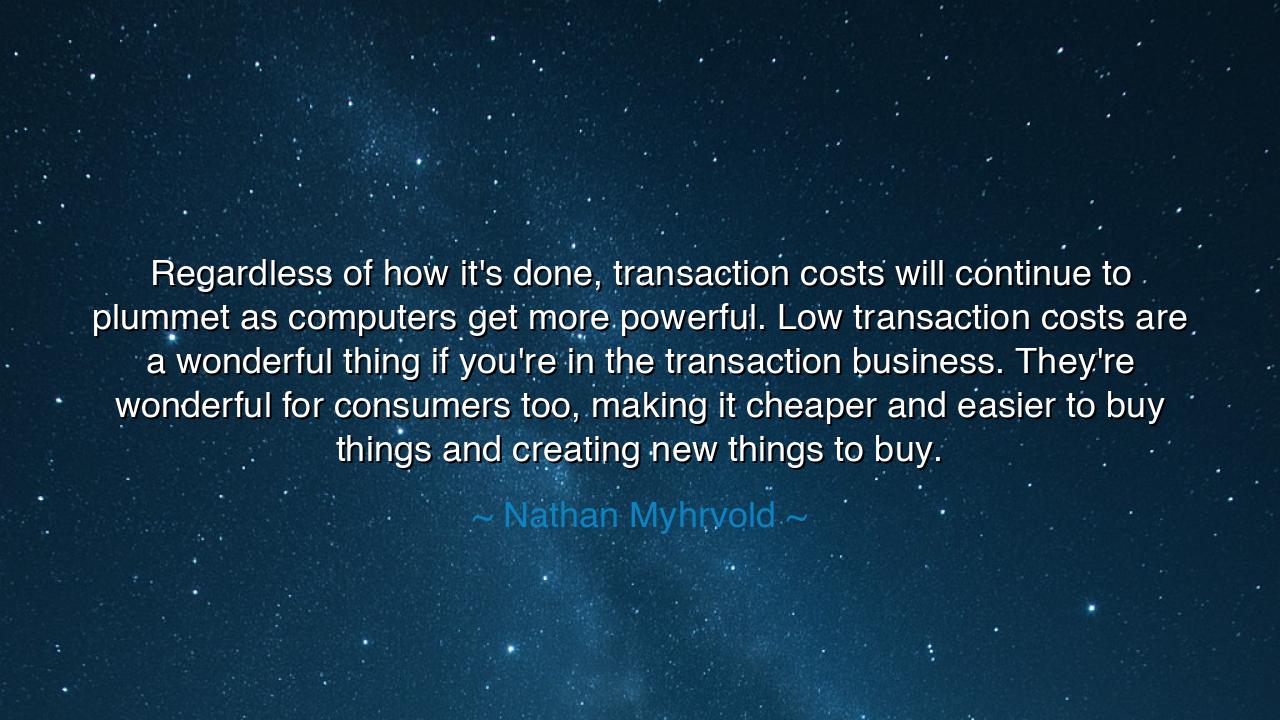
Regardless of how it's done, transaction costs will continue to
Regardless of how it's done, transaction costs will continue to plummet as computers get more powerful. Low transaction costs are a wonderful thing if you're in the transaction business. They're wonderful for consumers too, making it cheaper and easier to buy things and creating new things to buy.






“Regardless of how it's done, transaction costs will continue to plummet as computers get more powerful. Low transaction costs are a wonderful thing if you're in the transaction business. They're wonderful for consumers too, making it cheaper and easier to buy things and creating new things to buy.” — Nathan Myhrvold
Hear now the insight of Nathan Myhrvold, a seer of the digital age, who looked upon the rise of machines and foresaw not only their might, but their quiet transformation of human exchange. His words speak of transaction costs, yet beneath this language of commerce lies a truth far greater: the evolution of how humankind connects, trades, and creates. He tells us that as computers grow more powerful, the barriers that once slowed or burdened exchange — the time, the effort, the distance, the middlemen — shall crumble, until all things flow as freely as thought itself. This is not merely an observation of economics; it is the prophecy of a new civilization, born from speed, precision, and interconnection.
In the elder days, every transaction — every trade, every deal, every bond between buyer and seller — carried a weight. There were roads to cross, papers to sign, coins to count, and words to trust. Merchants bore risk, and travelers bore danger. The cost of doing business was not only measured in gold, but in time and uncertainty. But then came the computer, that modern Hermes, messenger of instant communication. It tore down the walls between buyer and seller, between nations and markets, between dream and delivery. What once took days now takes seconds; what once required trust in strangers now requires only a secure line of code. Thus, Myhrvold speaks of a truth already unfolding: that low transaction costs are the invisible engines driving the age of abundance.
Behold the tale of Jeff Bezos, who in the twilight of the 20th century gazed upon this same principle and built an empire upon it. In a small garage, surrounded by the hum of servers, he saw that the true wealth of the future would not lie in warehouses or storefronts, but in reducing the friction of trade. He understood that the easier it is for a person to act — to buy, to sell, to connect — the more life would flourish through commerce. From this vision rose Amazon, not as a mere store, but as a living testament to Myhrvold’s wisdom. Every click became a transaction nearly effortless; every second, new possibilities bloomed. Thus, the plummeting of transaction costs did not merely enrich business — it reshaped civilization itself.
Yet Myhrvold’s words also carry a gentle warning. For when something becomes easy, it also becomes abundant — and when abundance grows, so must wisdom. The ancients taught that even gold, when too easily gained, loses its value. So too with our digital wealth. When computers make everything swift and seamless, mankind must guard against the dulling of discernment. The flood of choices, the endless ease of consumption, can drown the thoughtful mind. Thus, while low transaction costs are a wonderful thing, they demand of us new virtues — mindfulness, moderation, and purpose. For the same tools that empower creation can also feed excess and distraction.
And yet, the marvel remains. These falling barriers between people and products, between idea and action, have given rise to an age of creativity unlike any before. When the cost of doing is nearly zero, imagination becomes the true currency. The artist, the inventor, the child with a dream — all are now merchants in the great market of thought. New forms of work, new crafts, new marketplaces are born every day, each a testament to the power of efficiency turned toward creation. The computer becomes not only a tool of trade but a forge of innovation, birthing worlds upon worlds within its circuits.
In this, Myhrvold’s insight becomes both a prophecy and a philosophy: that progress lies not in hoarding power, but in dispersing it — in lowering barriers, in widening access, in multiplying the hands that can build and buy. Every drop in transaction cost is an act of liberation. It frees the craftsman to reach the world, the thinker to publish his truth, the poor to access what was once distant and rare. When exchange becomes effortless, collaboration becomes infinite. And from that, a richer, more connected humanity is born.
So take this teaching to heart, O child of the digital age: the power of technology lies not merely in its speed or its strength, but in how it frees human potential. As transaction costs fall and opportunity expands, ask yourself — what will you create, now that the gatekeepers are gone? Use your tools not for idle gain, but for the upliftment of yourself and others. Let your trades, your clicks, your choices be guided by wisdom. For though Myhrvold speaks of economics, his words touch eternity: every time the world grows faster, we must grow wiser. And in the harmony of those two — progress and purpose — lies the true wealth of humankind.






AAdministratorAdministrator
Welcome, honored guests. Please leave a comment, we will respond soon